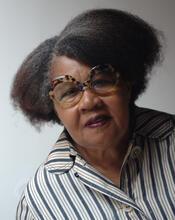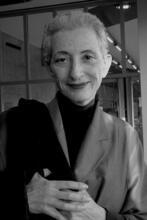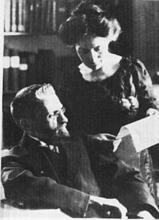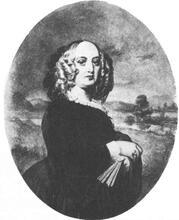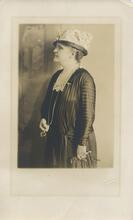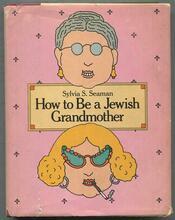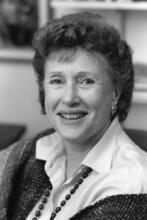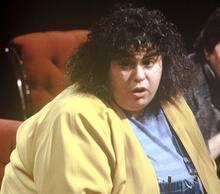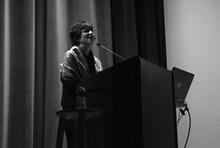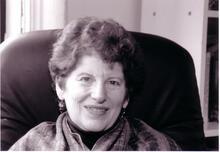Lazarus, Nahida Ruth
Nahida Ruth Lazarus was born in Berlin, Germany, as Anna Maria Concordia in 1849. Anna Maria spent her early childhood traveling with her mother, Nahida Sturmhöfel. In 1864, Lazarus moved to Berlin, where she established herself as an author, playwright, and theater critic. In 1869, under the pseudonym Ruth Nahida Sturmhöfel, she published her first comedy, Die Rechnung ohne Wirt, which was followed by numerous plays, novels, and essays signed under the name Nahida Remy. In 1891 she published The Jewish Woman, which was translated into English and Hebrew and went into its third edition only one year later with its fourth in 1922. In 1894 Nahida Ruth Lazarus formally converted to Judaism. In 1928, she died in Merano, Italy, at the age of 79.
On March 22, 1891, Professor Dr. Moritz Lazarus—himself not altogether free of prejudice towards women—wrote in his foreword to Nahida Ruth Remy’s The Jewish Woman (Das jüdische Weib): “Writing about Jews is seldom without prejudice; writing by women is seldom thorough. But this book about the Jewish woman, written by a Christian woman, is both thorough and free of prejudice.” The book originated in Nahida Remy’s profound interest in Judaism, combined with her equally profound involvement in women’s rights. In the latter respect, she was following in the footsteps of her mother, Nahida Sturmhöfel (b. Flatow, West Prussia, 1822–d. near Spezia, Italy, 1889), an author and precursor of the feminist movement, who established a free-thinking women’s newspaper in Dresden in 1848, moved to Italy as teacher and journalist, and occasionally made her living by embroidery and flower arranging. In 1860 she participated in the Italian wars of liberation and in 1866 joined the Red Cross.
Early Life and Family
Anna Maria Concordia, as she was originally named, was born in Berlin on February 3, 1849. Her father, a Prussian officer, left her mother even before Anna’s birth. Anna Maria spent her early childhood traveling with her mother in the south of France, Italy, and Sicily. While her stepfather, art historian Max Schasler, appears not to have been fond of her, her mother’s influence on her development, inclinations, and career was critical.
In 1864 Anna moved to Berlin, where she soon established herself as an author, playwright, and theater critic. In 1869, under the pseudonym Ruth Nahida Sturmhöfel, the twenty-year-old published her first comedy, Die Rechnung ohne Wirt, which was followed by numerous plays, novels and essays.
Her personal life then developed less happily. In 1873 she married the theater critic Max Remy, who died of an incurable disease eight years later. Thereafter, under the name of Nahida Remy, she published six more dramas and novels, scoring particular success with works on Italian themes, such as the play Domenico (1880), the novel Geheime Gewalten (1890), and the Sicilian novella collection, Heisses Blut (1885).
Conversion to Judaism and Jewish Writings
However, all this success failed to satisfy her. At the end of the 1880s she began studying Judaism with Prof. Moritz Lazarus, a noted theoretician on Judaism. She had found the second major theme of her life. In the years that followed she changed from a popular but convention-bound author into a woman who not only adopted Jewish culture but also studied its laws and teachings and wrote about them. For her contemporaries this was an astonishing transformation from worldly author to a scholar to be taken seriously.
In 1891m she published The Jewish Woman, a product of her fundamental interest in both feminism and Judaism, which aroused enormous interest. It went into its third edition only one year later and its fourth in 1922 and was translated into English and Hebrew. It was and remains an important source book for women’s studies, used and cited by countless female and male authors.
In her introduction to the 1922 edition, Remy wrote: “When I wrote this book I was a Christian. Today I am a Jew. I had to become a Jew because through my research and my cultural studies of Judaism I came to realize what the Jewish religion signifies. Thus the sentiments which led me to this work not only remained unchanged, but were reinforced and proved victorious.”
The Jewish Woman was the first of a number of works on similar themes, such as Das Gebet in Bibel und Lit. "teaching," "study," or "learning." A compilation of the commentary and discussions of the amora'im on the Mishnah. When not specified, "Talmud" refers to the Babylonian Talmud.Talmud (Prayer in the Bible and Talmud, 1892), Kulturstudien über das Judentum (1893) and Humanität im Judentum (1894). In 1894 she formally converted to Judaism. She described her conversion in an autobiographical novel, Ich suchte Dich (I Searched for You, Berlin, 1895), in which Christianity appears as a brutal and inhuman culture, from which she seeks to disengage herself by converting to Judaism. In all her works Judaism appears as the more human culture, since “The Hebrew laws are not only more human-friendly and more attuned to human psychology, but even the unwritten [i.e., oral] customs demonstrate tenderness and considerateness.” Only in Judaism were women highly regarded and perceived as the guardians of collective culture, whilst in other religions woman counts for nothing more than “a household creature devoid of power and will, or as serving only as a source of luxury and pleasure.”
Death and Legacy
In 1895 Remy married her mentor, Moritz Lazarus. We do not know whether he was initially attracted to his pupil or to her work, nor do we know when he aroused her personal interest, but the marriage was a harmonious and happy partnership, which ended only with his death in 1903.
Nahida Remy survived her husband by twenty-five years, working tirelessly on his literary legacy. Inter alia she published The Teachings of Lazarus, Memoirs and his autobiographical study, Aus meiner Jugend (Frankfurt am Main, 1913). She frequently lectured to educated audiences, both Jewish and Christian, advocating a more profound understanding of the common roots of both religions. Her ever-growing circle of friends were active in opposing the rising antisemitism.
In old age, Nahida Remy was beset by financial problems. The post-war inflation depleted her funds and she was compelled to sell her Berlin villa. Totally destitute, she died in Merano, Italy, on January 12, 1928, at the age of seventy-nine.
SELECTED WORKS BY NAHIDA RUTH LAZARUS
Novels and Plays
Wo die Orangen Blühen (story), 1872.
Constanze (drama), 1879.
Die Gräfin Eckardstein (drama), 1880.
Schicksalswege (1880).
Nazionale Gegensitze (drama), 1884.
Liebeszauber (drama), 1887.
Nonfiction
Das jüdische Weib. Leipzig: 1891.
Culturstudien über das Judentum. Berlin: 1893.
Ich suchte Dich. Berlin: 1895.
Gerstenberger, Katharina. "Nahida Ruth Lazarus's ‘Ich Suchte Dich!’: A Female Autobiography from the Turn of the Century." Monatshefte 86, no. 4 (1994): 525-42.
The Jewish National and University Library (which possesses Remy Lazarus’s legacy).
Lexikon Jüdische Frauen. Edited by Jutta Dick and Marina Sassenberg.
Kratz-Ritter, Bettina. "Konversion Als Antwort Auf Den Berliner Antisemitismusstreit? Nahida Ruth Lazarus Und Ihr Weg Zum Judentum." Zeitschrift Für Religions- Und Geistesgeschichte 46, (1994): 15.
Levenson, Alan T. “An Adventure in Otherness: Nahida Remy-Ruth Lazarus (1849-1928).” In Gender and Judaism: The Transformation of Tradition, ed. T. M. Rudavsky, 99-112. New York: New York University Press, 1995.

